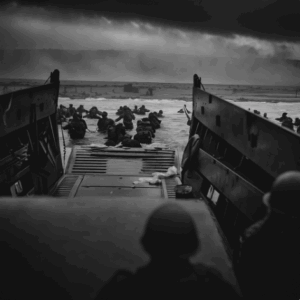 The Eyes of War: D-Day Through Young Eyes
The Eyes of War: D-Day Through Young Eyes
Nineteen. Waiting. Running into the unknown — for freedom, for each other.
Today we remember D-Day. June 6, 1944 — when young men crossed an ocean, faced the unknown, and gave everything to hold a beach and climb a cliff for the freedom we enjoy today. Many would not return. Yet they went — for country, for brotherhood, for us. Lest we forget.
“Greater love has no man than this, that a man lay down his life for his friends.” —John 15:13
They had crossed an ocean in the belly of a ship.
Gray steel groaning through the North Atlantic. Days stretched into weeks beneath decks thick with oil and sweat.
Most were nineteen. Some younger. None old. Boys in uniform, bound for a beach they had never seen.
Now they lay at anchor in the English Channel. Above, the wind cut cold. Below, young soldiers waited. Waited in the hold, waited in their gear, waited for the moment.
They had written their last letters. Some to mothers. Some to sweethearts. Some with no words left—only a scrawl and a name.
Now the call came: load out. No speeches. No brass bands. No promises.
“Tonight.”
They packed into Higgins boats, steel coffins bobbing on the black, bitter sea.
Shoulder to shoulder. Sardines in steel.
Breathing ragged. Hearts racing. Waiting.
The waves pounded. The sea pitched. Metal groaned. The boat swayed.
Stale air. Clenched fists. Sweat-soaked gear.
The stench of vomit, sweat, and fear hung thick.
No one spoke of it. No one cared.
They waited. Waited for the door to drop.
They knew what was coming. They had seen the maps. They had studied the photos. They had heard the briefings.
Omaha. Utah. Sword. Gold. Juno.
The beaches were mined and trapped. The bluffs behind—German guns dug in, concrete and steel, raining fire from the heights.
They would be the first wave. First out. First to die. They knew it.
Why go? For God and country? Yes. For family? Yes. For the brother beside them? Most of all.
Some for love of home. Some for duty. Some because no man would let his brother go alone.
Waiting. Waiting. Waiting.
The ramp was ready. The command was simple:
“When the door drops—MOVE. Don’t stop. Don’t think. RUN.”
The boat lurched forward. Engines roared.
The waves slammed the hull.
Hearts pounded. Hands trembled. Steel sang beneath them.
The ramp slammed down.
Gunfire. Gunfire. Gunfire.
A wall of lead and flame.
The first men fell before they touched the water.
Still, they ran. Through waist-deep surf, through fire, through smoke.
Through the pounding sea. Through the pounding guns. Through the pounding in their ears.
Some sank. Some crawled. Some clawed their way to the sand.
Some lived. Many did not.
The beach was a slaughterhouse. Sand churned to mud. Blood stained the surf. Bodies littered the tide.
And still they came. Inch by inch, they pushed forward.
By nightfall, they held a line. Thin. Bloodied. But they held.
Behind them, the sea carried the dead.
Around them, the wounded cried in the dark.
Gunfire cracked through the night.
The eyes of war saw what no man should see.
Then came the following command: take the cliffs.
Through wire and smoke, through mortar and flame, they climbed.
Hands bleeding. Boots slipping. Bullets shrieking.
They climbed for their brothers. They climbed for the fallen.
They climbed because failure was not an option.
By dawn, the cliffs were theirs.
The price was high. The ground was won.
Without their courage, where would we be?
They were young. They were afraid. But they went.
For freedom. For each other.
Not the face of war. The eyes of it.
Eyes that saw death—and still moved forward.
“Greater love has no man than this, that a man lay down his life for his friends.”
(John 15:13, Holy Bible)
“That from these honored dead we take increased devotion to that cause for which they gave the last full measure of devotion.”
(Abraham Lincoln, Gettysburg Address, 1863)
Lest we forget.